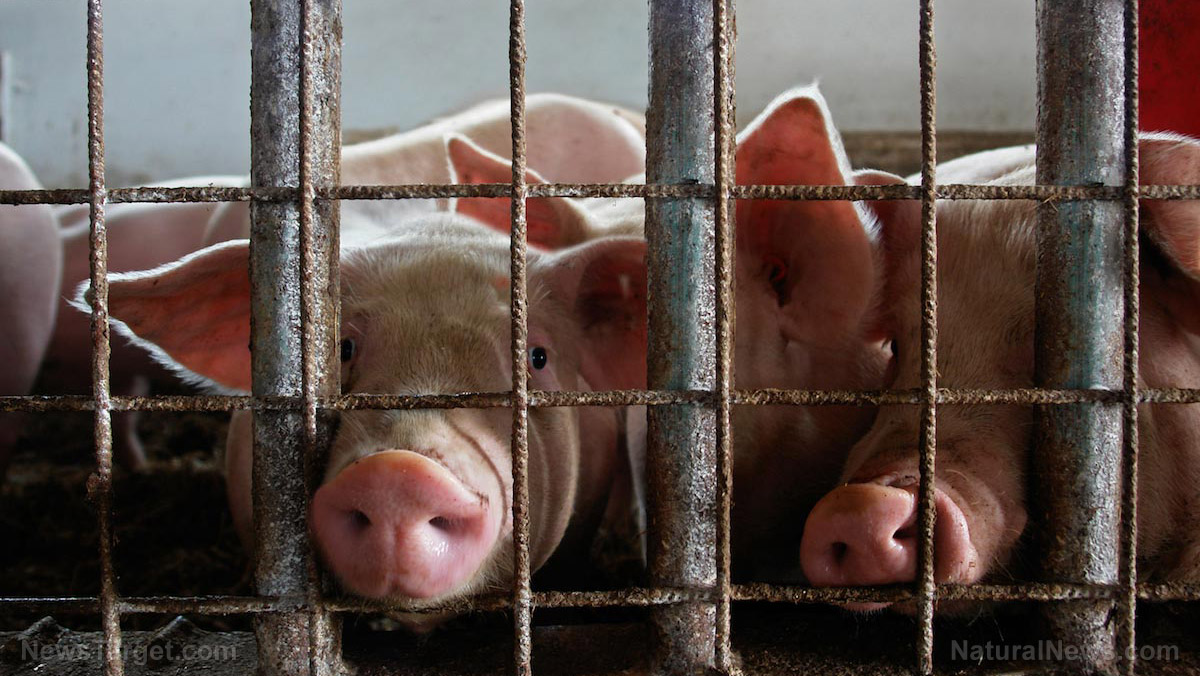FDA approves genetically engineered pigs for food and medicine
12/22/2020 / By Lance D Johnson

Genetically engineered pigs will soon be introduced into the American food supply. The U.S. Food and Drug Administration (FDA) just approved the first-of-its-kind, intentional genomic alteration for domestic pigs. The experiment takes animal farming to an entirely new level, introducing genetic alterations that could cause genetic ripple effects for decades to come. The genetically engineered GalSafe pigs will also be slaughtered and used to create FDA-approved medications. Developers only need to seek FDA approval if they hope to use the genetically engineered pigs to create drugs, organs or implants for use in human medicine. This is the first intentional genomic alteration for a product with both food and medical uses.
“Today’s first ever approval of an animal biotechnology product for both food and as a potential source for biomedical use represents a tremendous milestone for scientific innovation,” FDA Commissioner Stephen Hahn said in a statement.
FDA unleashes genetically altered pigs into the food and medicine supply
The company behind the genetic experiment is Revivicor. The company plans to develop the pigs, have them slaughtered, and then offer the meat for sale by mail order. Supermarkets will not be involved in the beginning rollout. Revivicor was started in 2003 by PPL Therapeutics, a UK company that helped clone the first animal, Dolly the Sheep. Now the company is looking to give the world its first genetically altered pig supply.
They believe the alteration will change medicine for the better and allow people to enjoy pig meat without suffering from specific meat allergies. The scientists have genetically altered the animals so they no longer produce a specific kind of sugar on the surface of their cells. This sugar is allegedly the trigger that causes some people to have meat allergies. The scientists behind the genetic edit believe that these experimental pig cells can be used in organ replacement and skin grafting, too, without being rejected by the recipient’s immune system. These new pig tissues could be made into skin grafts, hernia repairs, heart valve replacements, or new tendons, as genetically modified pigs are incorporated into human DNA.
What are the risks of merging genetically altered animals with humans?
Cross-species procedures such as xenografts or xenotransplantation are often risky because the human recipient’s body may reject the foreign cells. One of the reasons why rejection rates are so high is because of the presence of the alpha-gal sugar that exists on the surface of these animal cells. The allergic reaction is initiated when a Lone Star tick transmits alpha-gal sugar into a person’s body. When that person eats red meats such as beef, pork or lamb, their immune system may reject the alpha-gal sugar in the meat, causing a mild to severe allergic reaction. The new FDA-approved GalSafe pig may reduce some of these reactions, and in medicine, these genetically altered cells may reduce the incidence of organ rejections.
Steven Solomon, director of the FDA’s Center for Veterinary Medicine, was excited to approve the first genetic modification of an animal for both food and medicine, but did not elaborate on whether alpha-gal is the only source of organ rejection during procedures.
Solomon did warn, “I think that people need to be careful. That’s why in part, it’s going to require further evaluation for xenotransplantation, xenograft, or the other activities by the medical products centers and FDA.” The FDA is also unsure if the genetically altered pigs could exacerbate the problem of antimicrobial resistance of bacteria in humans. It’s hard to know exactly how these intentional genetic alterations affects both humans and animals.
The first use of these pig cells is already in a Phase 1 clinical trial. XenoTherapeutics wants to use the pig cells for the treatment of burn wounds. Revivicor believes these cells could also be used to make a safer version of heparin, a common blood thinner used as heart attack treatment and to prevent blood clots for certain surgeries.
For more on genetic experimentation of microbes, plants, animals and humans, check out GMO.News.
Sources include:
Submit a correction >>
Tagged Under:
animal experimentation, biotech, Ecology, environ, FDA, food science, food supply, frankenfood, genetic consequences, genetic engineering, genetically altered pigs, genetically modified medications, GMO, GMOs, meat allergies, organ transplant, skin grafting
This article may contain statements that reflect the opinion of the author
RECENT NEWS & ARTICLES
COPYRIGHT © 2017 ENVIRON NEWS





















